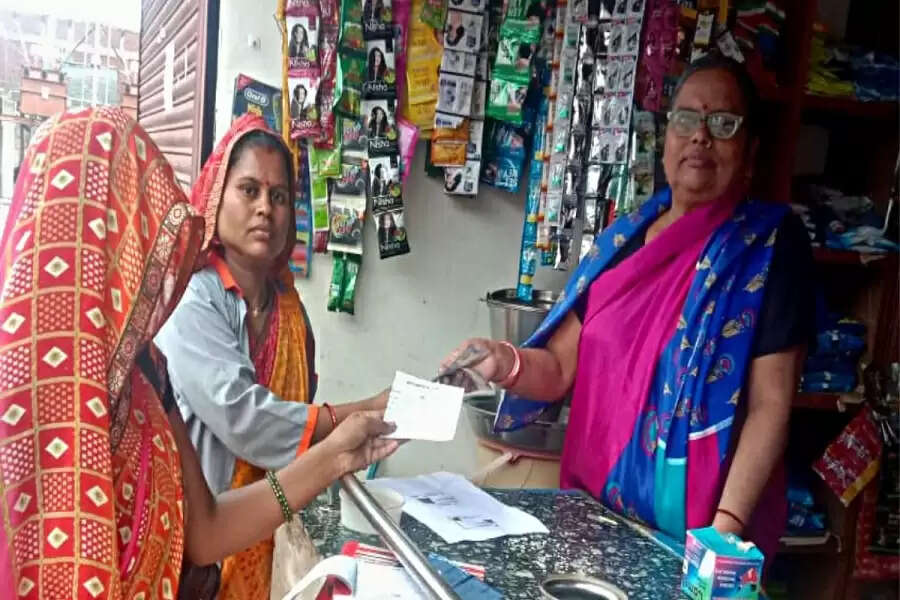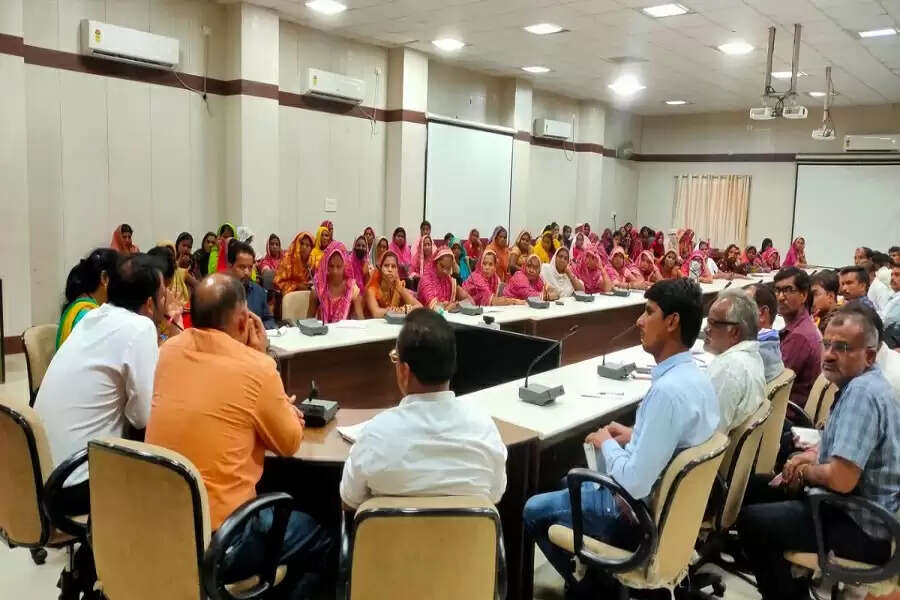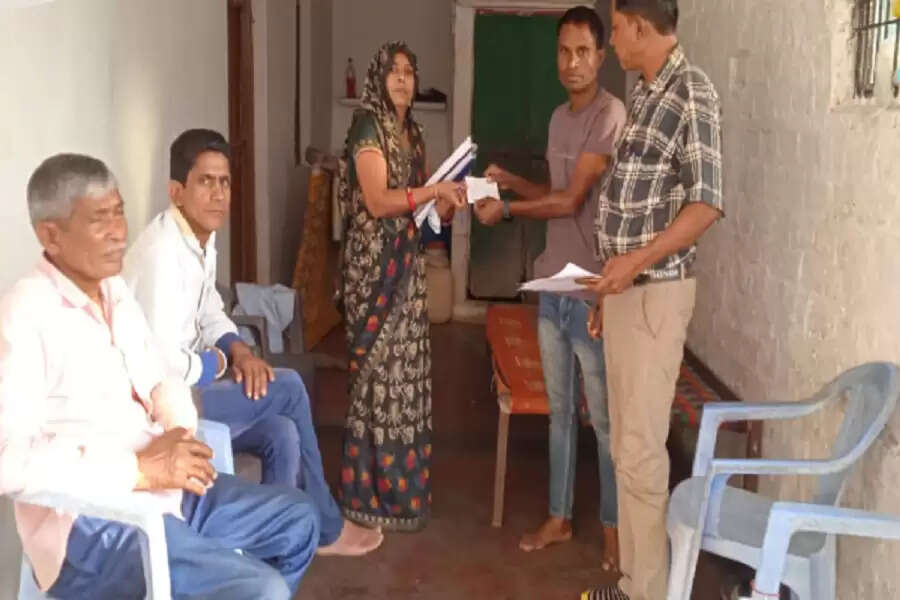-
Tax sakhis face citizens’ discontent in rural Bhopal
 Mamta Sahu (centre), the tax sakhi at Mengra Kalan, says they face problems doing their job because they don't have ID cards yet (Photo- Sanavver Shafi)
Mamta Sahu (centre), the tax sakhi at Mengra Kalan, says they face problems doing their job because they don't have ID cards yet (Photo- Sanavver Shafi)The district panchayat employs SHG women for collecting taxes from households and commercial establishments, but poor villagers are annoyed by the new financial burden.
Sanavver Shafi
Bhopal, Madhya Pradesh: “You approach anyone regarding tax payment and they instantly get angry. They will claim villages do not have the kind of taxes that we want them to pay. Only with time and effort can we make them pay their dues,” Sonam Bai talks from her experiences as a ‘tax sakhi’ in Fanda Kalan village panchayat.
In a new initiative launched in April, the Bhopal district panchayat has employed members of women's self-help groups to collect taxes. Known as tax sakhis, two women from each village panchayat are put on the task.
Going door-to-door, they collect Rs 200 in property tax, Rs 50 in swachhta (cleanliness) tax, Rs 1,400 in commercial tax from shops, fairs and markets and Rs 100 for water supply from every household. They start collection around the 10th of every month, with their working hours dependent on how fast they are able to convince the people to pay up. The entire process gets over within five to 10 days in some places, while it can take 15 to 20 days in others.
From the total amount collected, the tax sakhis receive 10% commission, which can be from Rs 3,000 to Rs 10,000 a month.
The tax sakhis, selected from among SHG members, were provided training by the district administration during the months of March and April (Photo sourced by Sanavver Shafi)
Only patience pays off
Girish Tavse, the nodal officer of the tax sakhi initiative in Bhopal and district functional manager of the National Rural Livelihood Mission (NRLM), says the scheme's roadmap was prepared in January. "Subsequently, we instructed the NRLM manager of every village panchayat to send a list of educated and active women from their local self-help groups. From this, we interviewed and selected the tax sakhis in a process that took us two months."
A short training session was conducted in March, and the women were ready for work in April. However, tax collection could begin only after the panchayat elections were concluded last month
“We were taught how to make receipts and upload information on the online portal in April itself. The village panchayat also helped in organising an awareness campaign,” Shanti Meena and Rasoom Bai of Nazirabad village panchayat in Berasia block tell 101Reporters.
But once the fieldwork began, they learnt about the degree of difficulty involved in getting people to part with their money. “Their response was not good. Some were angry with us, which was very demotivating,” the tax sakhis say.
“We then decided that we will first ask people whether garbage collection, water supply and sanitation are proper in the area. We ask them to pay taxes only afterwards.” They say their new plan has resulted in better response, and hence improved the returns.
“Even if we don’t have enough to eat at home, we must pay taxes on time,” says Ghisya Bai (34), a daily wage labourer from Eithkhedi village.
Sitting alongside Ghisya in the verandah of her mud hut, Mon Bai admits it is a good thing that door-to-door collection of garbage is happening. “But, they seem to have forgotten about the piped drinking water. The pipes are installed, but no water comes out. And, we are taxed for it,” Mon exclaims.
What both sides say
Under the Union Government's Har Ghar Nal Jal Yojana, drinking water supply to every household through taps was set to begin last year. Even as several villages were awaiting connection, tax collection for the same started in April.
The garbage collection is taking place in over 1.2 lakh households in Bhopal district’s 644 villages. The district panchayat has arranged garbage collection vehicles — they play sanitation campaign songs during the rounds — for each village panchayat. Tax, if any, are imposed under the Gram Swaraj Act, 1993.
In many villages of Fanda and Berasia blocks, tax collection is still a challenge. Several villagers 101Reporters spoke to complain that besides lack of basic amenities, taxes compound their miseries.
Rupesh Ahirwar and Pankaj Meena of Mengra Kalan panchayat in Berasia block work as labourers, and can barely afford to miss a day’s work. “Daily expenses are rising. On top of that, we are expected to pay up. These taxes are said to be for water supply and sanitation, but both are missing here,” they lament.
But tax sakhis have a different viewpoint. Rani Mewada of Fanda Kalan says villagers are still getting used to the idea of taxes. “When they do start paying, they can put forward their issues before the administration,” Mewada explains.
Pradeep Ahirwar (55) of Nazirabad claims his village is regularly cleaned and garbage collected at doorstep. "We have agreed to pay tax only because of this. We want a solution to the tap water supply issue, too," he says. His fellow villager, Deepak Dangi (45), concurs. "Garbage no longer piles up here. So we are paying the cleanliness tax. When the water problem is solved, we will pay that tax also," he says.
Shanti Meena from Nazirabad says they were taught how to make receipts and upload information on the online portal in April (Photo- Sanavver Shafi)
Ironing out the issues
Mamta Sahu and Phoolvati Rajput, the tax sakhis of Mengra Kalan, say they face problems as no identity cards are issued to them. “When we approach people, they want to see our IDs. We raised this issue with both the village and district panchayat officials. Thanks to all-round support, we will receive our ID cards soon."
Though tax sakhis have been trained to use spot billing machines, they are yet to receive them. So far, they have been giving receipts manually and uploading a copy online.
“All tax collection records were maintained offline, which often led to data misplacement. Now everything is available on the online portal, so the margin of error is low,” Bhopal District Panchayat Chief Executive Officer Rituraj Singh tells 101Reporters.
He says a review meeting regarding tax collection is held every week and the responsibility to provide assistance to tax sakhis in village panchayats has been entrusted to the respective panchayat secretary and Rojgar Sahayak. Two nodal officers have also been appointed in Bhopal district to oversee the problems faced during tax collection.
Girish Tavse notes that many villages see zero tax collection. A team has been formed to figure out the reasons. Once they submit the report, a decision may be taken to retrain or replace the women.
Meanwhile, Umakant Umrao, Principal Secretary, Panchayat and Rural Development, explains how extensive work is being done to make panchayats self-sufficient. Umrao claims the state government has given leeway to families living below the poverty line.
“No new taxes are being levied. We are only ensuring that tax payment becomes mandatory. For this, necessary monitoring is being done and we are encouraging panchayats to set up their own funds,” Umrao says, adding that taxes are being levied only on the basis of the facilities provided in villages.
So what happens if someone living above the poverty line refuses to pay up? According to Rituraj Singh, such persons will be informed about the reasons why they should pay up. “Even if they are not ready to toe the line, legal action can be initiated against them.”
Meanwhile, Mamta Sahu and Phoolvati Rajput say people are still not very cooperative. They hope it will pick up soon, as higher collection means better pay for them.(The author is a freelance journalist and a member of 101Reporters, a pan-India network of grassroots reporters.)
